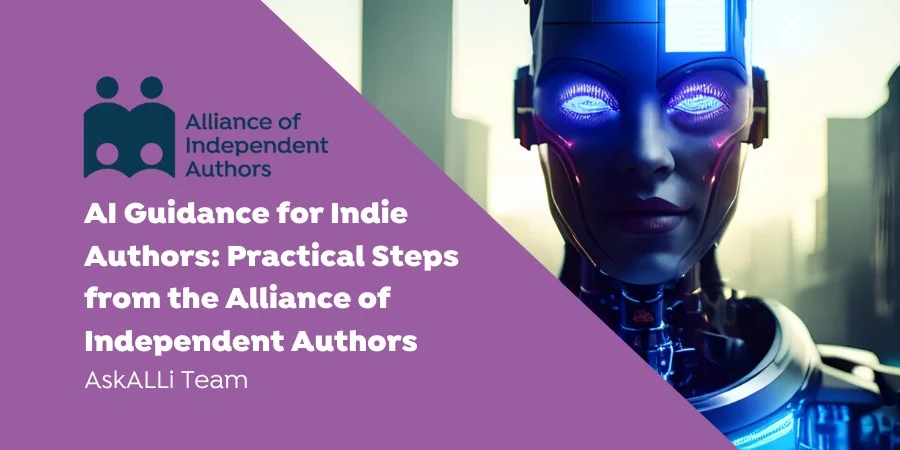 ***UPDATED: August, 2024***
***UPDATED: August, 2024***
Like all author and publishing associations, the Alliance of Independent Authors has been following the ongoing developments regarding AI and authorship in recent months. We know just how important it is for all of us as authors to understand developments as AI pervades almost every aspect of our industry.
Today, we share our practical steps to stay up to date in 2024. To read our ethical AI guidelines visit: ALLi Ethical AI Guidance for Indie Authors
What is “AI” (and What is It Not)?
The ALLi glossary uses the following definitions related to “AI”:
- Artificial intelligence is technology that replicates human behaviors and abilities conventionally seen as “intelligent.”
- Augmented intelligence is applications or tools that combine human and machine intelligence.
This article addresses both of these forms of AI.
This article does not address more basic forms of machine “intelligence,” such as word processing spell checkers or grammar checkers. It also does not include tools using “narrow AI,” where computers provide support based on specific expertise in a particular area: advertising algorithms, reader analysis and engagement, search and sales engines, and speech-to-text.
AI Tools for Human Creators
ALLi supports the use of AI as a tool for ethical creators, not as a creator itself. AI mimics intelligence and creativity by drawing on a vast pool of human-created content. It can create based on past creations, but if cut off from those sources, its output would degrade; if we were given AI tools trained only on Victorian inputs, we would be shocked and disappointed at the results. AI can learn from mistakes but only where a human indicates that an output is not satisfactory. AI has also been repeatedly shown to be susceptible to biases and to making up information when it does not have the right data to hand.
The job of the independent author is to write great words, publish great books, and reach those readers who will value them most. AI provides tools that are useful in this work but also raises many practical, ethical, and creative questions. We recognize that AI is a complex and divisive issue and know that legal and ethical guidelines will be in flux for years to come. Our role in this continuing evolution is to provide education to indie authors related to AI and to lobby for the rights of indie authors in others’ use of AI.
We believe that actions undertaken by organizations can be more effective than actions undertaken by individuals, and we encourage authors to engage with ALLi on topics related to AI, either as an ALLi member or via our resources at SelfPublishingAdvice.org, which are available to all authors.
The answers to how AI will impact authors range from apocalyptic to utopian, and as with most new technological breakthroughs, the reality will likely fall between these extremes. ALLi's policy is to encourage the best options, campaign against the worst, and support our author members in making informed decisions.
We frame our position on AI around four pillars: clarity, consent, compensation, and curiosity.
Clarity
ALLi is lobbying for greater clarity and transparency from technology companies about how their AI models are trained and encouraging clarity and transparency from authors. Organizations developing AI tools should be required to maintain a log of what material has been used, accessible on request or made publicly available. Links to source data enable users to assess the relevance and reliability of those sources or to double check the AI’s output. Such links also acknowledge the contributions of the creators of the source material.
Individuals or organizations who use AI for decision-making should divulge this use. Such situations might arise for authors in the context of an AI assessing quality of work for awards, eligibility for economic benefits from grants, or an individual’s qualification for appointment to a role. In addition, creators must have a simple way to request a human review within a reasonable timeframe.
Creators also have a responsibility to provide clarity about their use of AI, for example, in a note on the copyright page.
Consent
A clear process is needed for obtaining consent from creators for use of their material. No AI tool built using copyrighted material without consent can be considered fully ethical, and copyright law is the standard against which we judge the ethics of each AI’s data-gathering process.
ALLi’s Copyright Bill of Rights outlines authors' rights and responsibilities under copyright law, and we have incorporated information on AI into this guide. (Also see our podcast about the Bill of Rights) In fact, much of the data upon which AI tools are trained allegedly comes from pirate sites of the kind already flagged by ALLi as unethical.
Publishers should include clauses related to AI in all contracts, specifically requiring active consent for an author's works to be used in training AI. Contracts should also require content to use AI tools to create derivative work from an author’s IP–for example, translations or narration.
Users should be able to opt out of having their work used to train AI tools. This is especially vital for authors, since there are many uses of AI that would require an author to input works in progress, synopses, plot ideas, blurbs, etc. AI platform agreements should also include a commitment to the confidentiality of such data.
Clarity is also needed in the laws and guidelines related to content. For example, if an author unintentionally infringes on another author’s copyright by using output from an AI and not checking its sources, who is responsible for that infringement–the author or the AI? Providing clarity around such situations will protect indie authors from unintended violations.
Compensation
The theoretical protections of copyright, which can only be held by humans, are frequently being violated by the companies developing AI tools, who have offered no licensing payment for the use of the material used to train the AI. But how might compensation work, especially across the huge number of impacted creators?
The voluntary license model that is already used for secondary uses / rights and the fees that are collected and distributed to authors by existing Collective Management Organizations (CMOs) such as the UK’s ALCS or the US’s ASCAP could provide a model. Models also need to reflect that once data is ingested into an AI system, it will be used repeatedly.
When a compensation system is established, it should handle both payments from that point onward as well as a one-time retrospective payment for past use. (Since data cannot be removed from an AI tool, consent cannot be withdrawn for data already included in the database.)
Solutions addressing issues related to both consent and compensation must be implementable across borders; otherwise creators risk falling through the net of IP protections. ALLi campaigns for and supports legal decisions that are not specific to one country and that smoothly link into laws and policies internationally.
Curiosity
Keeping in mind the challenges and issues described above, ALLi recommends that authors bring a spirit of curiosity to their consideration of AI, and be willing to explore the potential of AI in their work as writers and publishers.
AI tools can open opportunities for both authors and readers; for example:
- AI can help disabled writers to do their best work, as discussed in this podcast conversation between Joanna Penn and SJ Pajonas.
- AI narration provides audio content at a fraction of the cost of human narration, making it financially feasible for authors earlier in their careers and creating far more content for visually impaired readers than would be possible with a reliance on human narrators alone.
- AI-generated book covers, audiobooks and translations can put indie publishing within financial reach of authors with a limited budget. This is not necessarily removing jobs for experts, as they wouldn’t be commissioning narrators / translators if they didn’t have AI
We encourage all authors to create their own AI policies for their own publishing businesses and to revisit and update them as the situation around AI evolves.
A Practical Approach to AI
This section includes questions about AI that have been flooding author groups lately. We have strived to answer each these in as practical a manner as possible.
- Will AI make writers defunct?
No. Humans have agency and intelligence, which, despite its name, AI does not. We are driven to create and we want to connect with other humans. AI tools won’t change those fundamental drives but it will change how society values certain kinds of writing and writers, and how writers connect with readers, in ways that are as yet unforeseeable. Right now, AI tools are being used by creators to help bring their ideas to fruition, often cutting out the most tedious parts of the job or allowing for more creative solutions.
- How might an author use AI in writing?
Writing is always a challenge and AI tools can help. “Some of us love to edit and revise but are loath to put that first word on paper, while others are the complete opposite,” says Amit Gupta, creator of Sudowrite.com. “Some get mired in the middle, others tear their hair out landing the ending. My belief is that just as spelling and grammar checking software lifted some of the load off our shoulders, software can do the same when we’re stuck in a scene, struggling to describe an object or a setting, or just not sure how to inject something fresh into a tired plot line.”
- Won’t AI result in the production of many more books, leading to market saturation?
The market is already saturated. There are already far more books available than any reader can read (as well as movies, TV shows, games, and other forms of entertainment). Yes we still write books and readers still. In fact AI tools with increasingly sophisticated recommendation algorithms are actually aiding book discoverability.
Readers know how to find what they love to read and love to make choices that support human creators. As AI tools improve, authors have to double down on being human. How? By finding the value in what we offer and then doing that more: more often, more intentionally, more liberally.
The publishing future, like the publishing past, belongs to those who can engage readers and stand out with a unique and identifiable voice—not those pushing a punishing, cookie-cutter productivity model that cannot outpace the machines, or those trying to pass off machine-generated work as their own.
- Should I declare my use of AI tools?
While authors are not legally required to declare the use of AI in their works, we encourage transparency regarding AI use. This recommendation aligns with ALLi's broader commitment to ethical publishing practices. Amazon KDP and other platforms ask authors to indicate whether any part of their book was generated by AI when they upload their manuscripts. This includes text and images and requires authors to disclose whether their content is AI-generated or AI-assisted.
AI-Generated: Content that has been entirely created by AI with little to no human intervention. For example, if an AI tool writes a chapter or generates images without significant editing or input from the author, this content would be considered AI-generated.
AI-Assisted: Content where AI has been used as a tool to aid the author but where the final output is significantly shaped by human intervention. For instance, an author might use AI to generate ideas, suggestions, or rough drafts, but then heavily revise, rewrite, or edit the content themselves. This would fall under AI-assisted.
The disclosure is intended to help Amazon manage the quality and originality of the content available on its platform, as well as to address potential legal issues related to copyright and intellectual property.
- How can I make the most out of AI as a creative business owner?
You likely use a computer as well as, if not instead of, handwriting your drafts. You probably use email more than snail mail, a cell phone rather than a landline, video streaming rather than DVDs. Using affordable AI tools that aid your creative and business processes is similar.
Ask 3 core questions:
- Which of my writing and publishing challenges can be met by AI solutions?
- Which AI tools do I want to implement in my writing and publishing?
- Which AI tools do I not want to implement in my writing and publishing?
Stay curious. Investigate the tools rather than making assumptions.
- How can I set my work apart from AI-generated work?
Two ALLi members, Kari Lineberry and Dana Chandler, came together as KD Resources to trademark a “Human Created Symbol of Distinction” that “signifies that the owner of the work attests that no Artificial Intelligence (AI) was used to write or create any portion of the work.”
There is one thing that AI, and indeed other authors, can never do: be you. Specialize in giving your writing your particular stamp. In your writing, communicate from your deepest experience, using your own voice, telling your own truths. In your publishing, focus on local, imperfect, real connections with other human beings: your readers and the authors in your niche whose work you most admire. Think about incorporating audio and video, where you cannot help but reveal yourself, into your marketing.
However you do it, be personal, be honest, be authentically you. Personality, values, personal branding: these become ever more key, as does true human connection with your readers.
The conversation about AI continues, and we’re happy to hear from our members any time.
If you'd like to know how you can create your own AI policy, download ALLi's guide to Developing Your AI Policy. Members can download the guide from the member website.
ALLi's Top 5 Tips:
1. Control AI access to your work
You can make some efforts to control what access AI has to your work and writing style, and what use it can make of it, from contracts, to consent, to what data you input into existing tools.
- Be careful of cloud storage systems and check whether they are allowing AI to use the data stored with them, either by their own tools or third-party tools. ALLi’s Watchdog has a list of these: ALLi Watchdog Desk
- Consider carefully any contracts with publishers looking to publish your work, including articles in magazines, papers or journals, and look especially for any references to whether they would allow your work to be used to train AI and how this would take place.
- Consider whether or not you wish to allow AI tools in the production of your work by a third party and make this clear—e.g. ask to see their own internal AI policy and consider whether you want AI to be used for such purposes as translation, production of audiobooks, editing, sensitivity reads, cover design and indexing. Ask your own team (editors, cover designers, etc.) what use they make of AI tools and then consider whether you are happy with their approach.
- Ask for images not to be AI sourced or generated should you wish to. These are individual decisions that only you can make for your author business.
- Capture your decisions about AI in your own ‘AI Policy’ so that you have a decision-making guide, and revisit it to ensure it reflects changing circumstances.
2. Use AI author tools carefully
We understand that authors may wish to make use of AI tools in their writing and business, and we do not wish any of our members to fall behind in their use of this technology should they decide to use it.
But before using AI tools we recommend you…
- Consider that in many instances, the tools were created without the permission of the creators of the content on which the tools were trained and in most cases do not compensate the creators for the use of their content.
- Remember that integrity and honesty are paramount. AI must not be used for plagiarism or to compromise the originality of content.
- Ensure you are not inputting copyrighted third-party material into an AI tool, as to do so is infringing someone else’s copyright without their consent. Only copyright-cleared or your own original materials should be used as inputs for AI tools.
- Be transparent about your own use of AI tools. Provide a clear declaration when AI has been used in the creation, editing, or publishing process, including in any publishing contracts. Make sure the extent of use of AI is clear. For example, it is unlikely a reader would care about using AI tools to spell-check a document, but they should know if AI was used to generate content from scratch.
- Maintain a high standard of quality for all your content, including AI-assisted content.
- Check any “facts” presented by the AI, since in the absence of sufficient data in their training database these tools are known to make up information.
Before using an AI tool, ask yourself what it is getting from you as well as what you are getting from it. By using these tools, you are continuing to train and develop them. You can think of this as ‘investing’ your data with a developer and using prudence in doing so, just as you would with investing your money in a bank.
3. Consider the ethical credentials of AI tool providers
ALLi is working to identify AI providers and tools that have better ethical credentials (e.g. their developers have implemented consent and ideally compensation initiatives). We will be proactive in drawing attention to them and in ensuring our author members know how to use them ethically.
You can also take steps to ensure ethical use of these tools: check the terms of service of any AI tools you’re considering using. In fact, a great use of AI would be to spot where an author’s works have been used without permission and to issue notices to take down/desist.

Photo by Jonathan Farber on Unsplash
4. For narrators of your own audiobooks: check industry AI guidance
For those authors who narrate their own works, there is a useful AI toolkit of information available from the performing arts and entertainment trade union, Equity. You can access the toolkit here: Equity Artist AI Toolkit
5. Do things AI cannot do
Consider what you offer that AI cannot and think about what you can do more of in this area. For example…
- Communicate from your deepest experience, using your own voice, telling your own truths.
- In your publishing, focus on local, imperfect, real connections with other human beings: your readers and the authors in your niche whose work you most admire.
- Incorporate audio and video—where you cannot help but reveal yourself—into your marketing or as a supplement to your books.
- Be more personal, more honest, more flawed, more authentically you. Personality, values, and personal branding will become ever more important, as will true human connection with your readers.
Resources
The AI landscape is changing week-by-week, and sometimes day-by-day, and this is your source for the latest information ALLi has to share on this topic, as well as educational resources to spur your curiosity about this new tool. You’ll find more information at our Self-Publishing Advice Center, which now includes a distinct AI category.
You can also refer to ALLi's Ethical AI Guidelines
To create your own AI policy, download ALLi's guide to Developing Your AI Policy. Members can download the guide from the member website.
Blog Posts & Podcasts
Joanna Penn: List of AI writing tools (regularly updated). This is a list of growing AI tools that you can use to help you generate a variety of different types of writing from prose, inspiration and prompts for your own prose, poetry, marketing copy and more. See also: 9 Ways That Artificial Intelligence (AI) Will Disrupt Authors And The Publishing Industry and Joanna's interviews with authors using AI tools:
- Cowriting with Artificial Intelligence with Yudhanjaya Wijeratne
- The AI-Augmented Author. Writing With GPT-3 With Paul Bellow
- Orna Ross & Joanna Penn: AskALLi Advanced Salon: Artificial Intelligence and the Indie Author Orna Ross interviews Joanna Penn about recent AI developments
Monica Dube: How Can Writers and Publishers Utilize Artificial Intelligence Blog post from PublishDrive
Holly Payne: AI and Book Discovery: SelfPubCon (Self Publishing Advice Conference) session where Holly Payne introduces AI as a book discovery and author comparison tool.
Books
Chase, Calum. The Economic Singularity: Artificial intelligence and the Death of Capitalism – Argues that Universal Basic Income is only part of the solution to how we'll manage a world where AI and other tools do most of the work. We are probably going to need an entirely new economic system. You may not agree with everything in this book but you will certainly be given food for thought.
Davenport, Thomas and and Kirby, Julia. Only Humans Need Apply: Winners and Losers in the Age of Smart Machines – The authors reframe the conversation about automation, arguing that the future of increased productivity and business success isn't either human or machine. It's both. The key is augmentation, utilizing technology to help humans work better, smarter, and faster.
Google: The People + AI Guidebook – Tools methods and best practice guidelines for those developing AI products in a human-centered way. Originally launched in 2019, now updated with new insights, offering a set of methods, best practices, and examples for designing with AI.
Lee, Kai-Fu: AI Superpowers – Taiwan-born Kai-Fu Lee believes China will be the next tech-innovation superpower and in his new (and first) book, AI Superpowers: China, Silicon Valley, and the New World Order, he explains why.
Penn, Joanna. Artificial Intelligence, Blockchain, and Virtual Worlds: The Impact of Converging Technologies On Authors and the Publishing Industry – How authors and publishers can embrace the opportunities and engage in conversations around AI in ways that positively direct the reinvention of our industry. Clear, practical and eye-opening. The must-read book for authors and publishers.
Tegmark, Max. Life 3.0: Being Human in the Age of Artificial Intelligence
A rich and visionary exploration of whether AI will eventually outsmart humans and replace us altogether or help life on earth flourish as never before.
Did you know there is now a Human Created Symbol to add to work that does not use AI? To find out more visit: Human Created Symbol Download
Thoughts or further questions on this post or any self-publishing issue?
If you're an ALLi member, head over to the SelfPubConnect forum for support from our experienced community of indie authors, advisors, and our own ALLi team. Simply create an account (if you haven't already) to request to join the forum and get going.
Non-members looking for more information can search our extensive archive of blog posts and podcast episodes packed with tips and advice at ALLi's Self-Publishing Advice Centre.






But how might compensation work